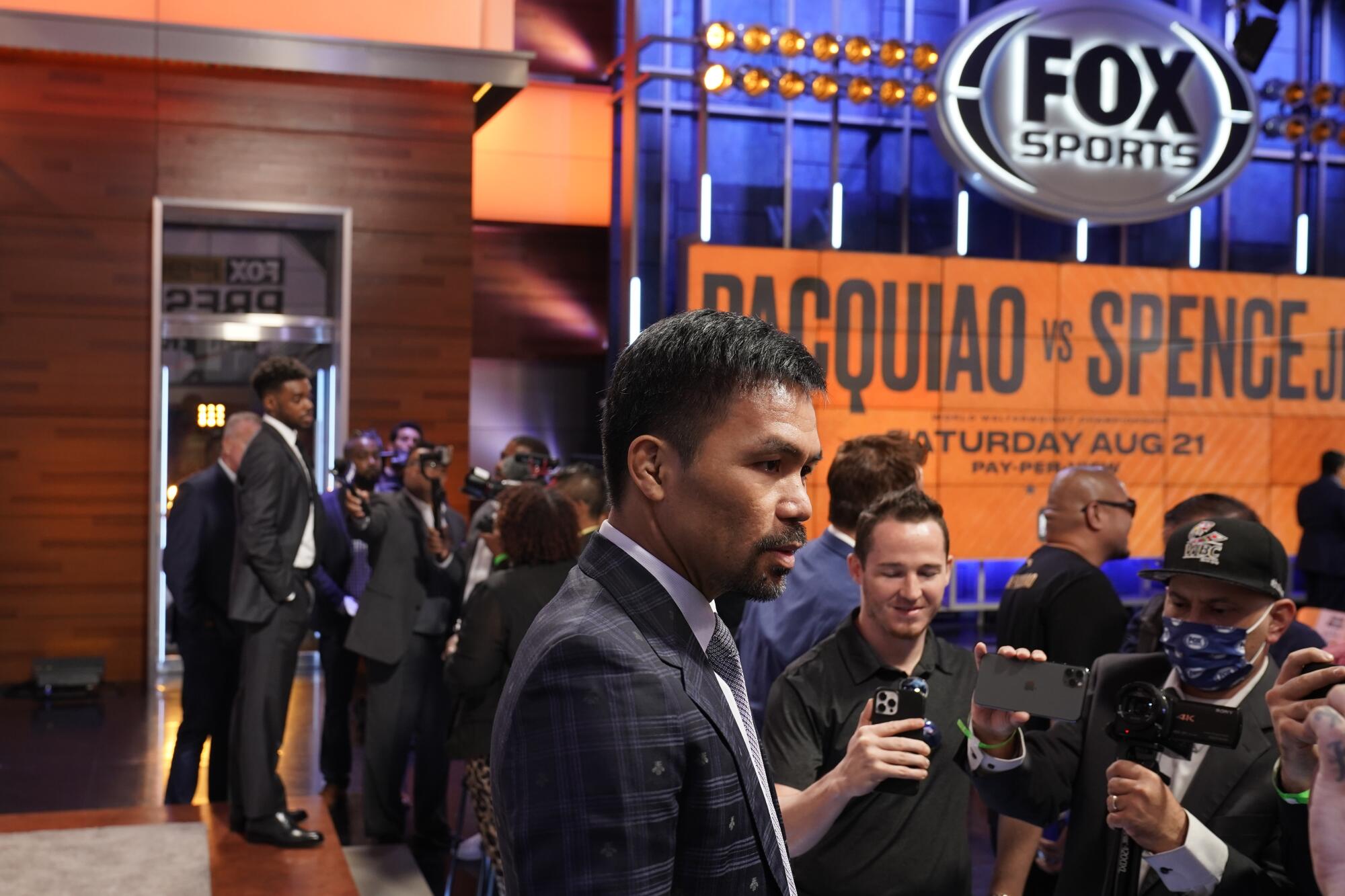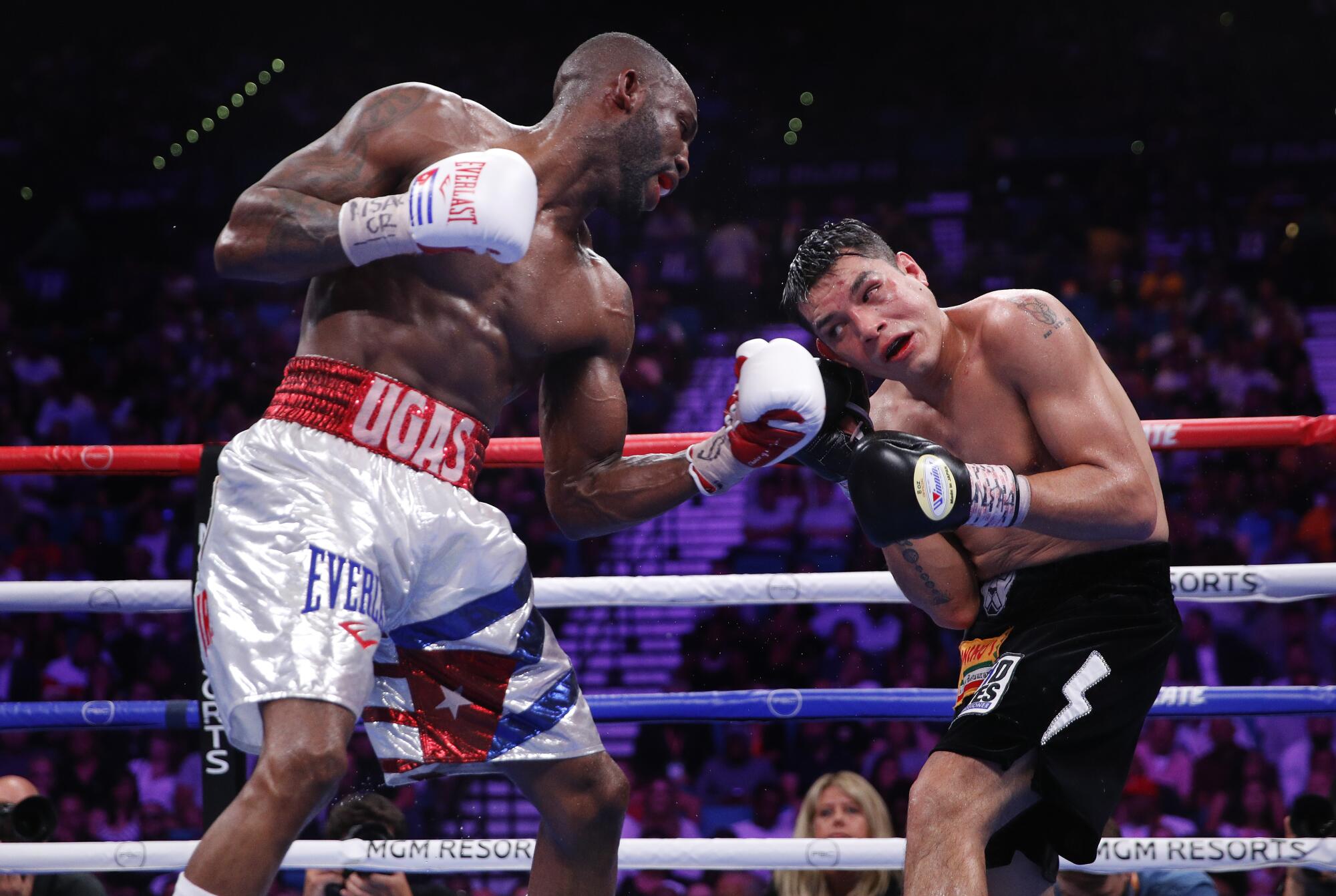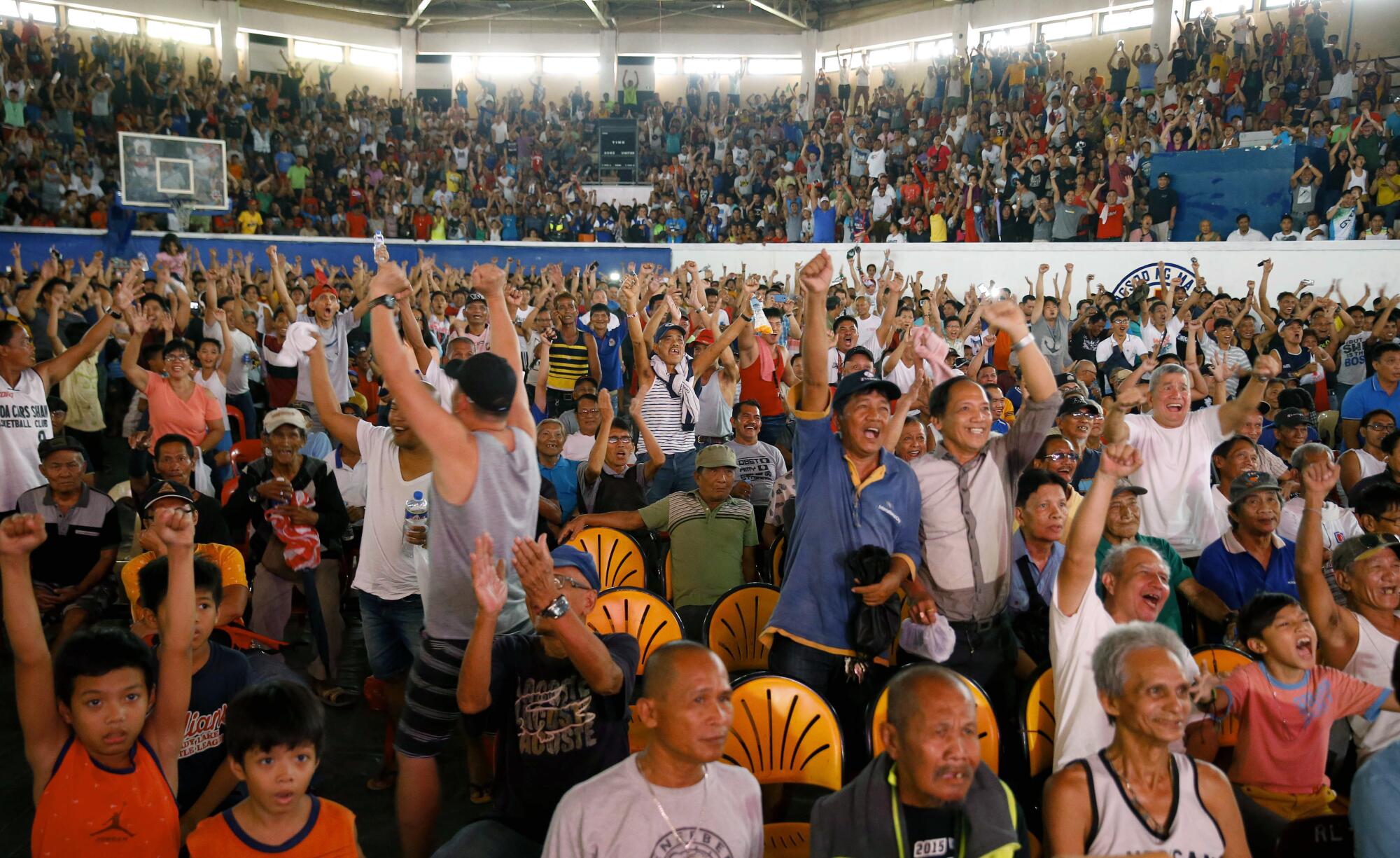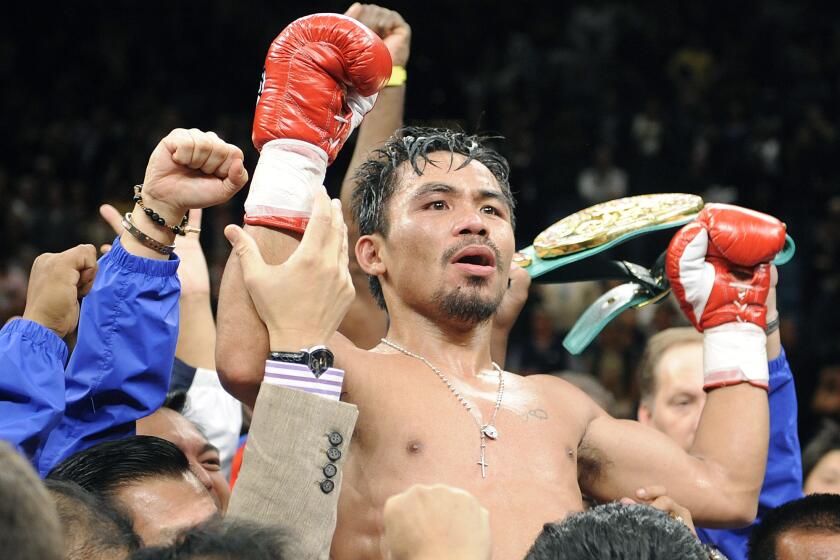
To be Manny Pacquiao is to smile and carry on.
He is a legendary boxer, about to fight in his 82nd professional match. He is one of just 12 senators who govern the Philippines. And if that isn’t enough, he is an almost certain candidate for the country’s presidency on May 9, 2022.
His cup runneth over. His life is nonstop chaos. He is, daily, pulled in nine different directions before he can get his socks on. A main Olympic storyline in recent weeks was about athletes succumbing to demands on them, to the pressure of expectations. If the same were applied to Pacquiao, he should, by now, be a puddle of water.
Saturday, at the 20,000-seat T-Mobile Arena in Las Vegas, he will step into a boxing ring again. At least that part should be simple. One venue, one opponent, let the fists fly. But like everything in boxing, and in Pacquiao’s life, the uncertain reigns.
Tuesday, he and his camp got word that the fighter he was to meet, highly regarded and unbeaten Errol Spence Jr., had to pull out. Spence had a torn retina in his left eye, a serious injury that might not have merely spoiled Spence’s big payday against Pacquiao, but also his career. Pacquiao, with the veteran poise of an air traffic controller, immediately issued a politically correct and sympathetic statement that said, “Thank God that the tear in Errol’s eye was discovered before it could be damaged further.”
Then he and his team got to work on a reclamation project. The fight. There would be another one, there would be a storyline and there would remain an opportunity for people to go to Vegas and buy tickets or sit at home and fork over the pay-per-view price. In the cash flow arena, boxing has a way of ending up on its feet.

Pacquiao will now fight Yordenis Ugas for the 147-pound WBA title. Ugas was scheduled to fight on the Pacquiao-Spence undercard, so he was primed and ready. The storyline that fell in the lap of the promotion is that Ugas was given the WBA title because the people who run the World Boxing Assn. decided that Pacquiao hadn’t fought enough to retain the title he won by beating Keith Thurman in July 2019. Now, Ugas will have to earn the title belt in the ring, not get it over the phone.
Ugas is from Cuba. He won a bronze medal in the 2008 Olympics. His record is 26-4, with 21 knockouts. With slightly more than a week to recalibrate the hype machine, the new mantra became: Stolen title now needing to be claimed for real in the ring.
With Spence, his youth and size and unbeaten record had become the tease for wagers that Pacquiao would lose, especially since Pacquiao is 42 and should be worn and vulnerable by now. But then, that’s what drove the betting on Thurman, who was put on the canvas twice, once on a body shot. Now, Spence’s replacement, with a title by default and a resume that seems less than ready for prime time, is only seven years younger than Pacquiao.
The other storyline being pushed is that Spence is a lefty, Pacquiao was preparing for a lefty in sparring, and Ugas is right-handed, so Pacquiao might be underprepared. Go ahead. Take that to the betting window.
The only real story is that Pacquiao is fighting again.
All this began for him at age 16, fighting and winning at 108 pounds. He had no trouble making weight because he seldom had enough to eat. Well before that first pro fight, he left home because he had become just one more mouth to feed. He scrambled as a street urchin, taking home what he could and boxing wherever they would hand him a few pesos.
Now, after winning 12 titles in an unprecedented eight divisions and starting to slip into the conversation about best boxers of all-time, he will put himself out there again. Which raises the obvious question: Why?
“Boxing is my passion,” he says, answering the same question the same way for the 14,296th time, while smiling and looking around the walls of the Wild Card Gym in Hollywood. There are pictures of him everywhere, with scores of celebrities and a like number of trophies and title belts. There are three giant flags on the west wall — Mexico, the United States and the Philippines. Around him, younger boxers slug the heavy bag and exhale with a noise at each contact that would send your house pet scurrying to hide under the couch. Bells clang to halt sparring. Then more to start it. The smell of sweat is overwhelming, and that’s just from the photographers.

For Pacquiao, lifelong boxer, fulltime philanthropist and now career politician, it is home.
His soulmate, advisor, buddy and strategist is Freddie Roach, who owns Wild Card, has been with him for 21 years and all those titles, and has survived dozens of other advisors, physical trainers, hustlers, schemers and sycophants. Roach is 61, had 53 pro fights — “Ten more than I should have” — and now carries on despite suffering from the effects of Parkinson’s Disease.
To be Pacquiao’s main cornerman includes doing the mitts, which means putting pads on each hand and moving them for a sequence of hard punches. If Pacquiao gets the sequence wrong, or the mitt isn’t in the right place, Roach gets hit. Roach occasionally spends his evenings with his hands in ice. Sometimes his head. That he can still do this, despite Parkinson’s, is exceptional.
Roach, whose gym business thrives even without Pacquiao around, says that Pacquiao is the “best thing that ever happened to me.” He recalls their first meeting.
“Muhammad Ali had just come in and visited the gym,” he says. “I was thrilled and said something like I hoped someday the next Ali would walk in. Two weeks later, he did. This skinny little kid from the Philippines was looking for somebody to do mitts.”
It was 2000, and very quickly, they got thrown into a title fight as a substitute, going against a bantamweight champion (123 pounds) defending his title. They were told they had no chance. They were told wrong. Pacquiao won with a technical knockout and has never looked back.
Nor has he stopped venturing out. Long before he decided to run for office, Pacquiao’s desire to “help the people” evolved through philanthropy, although not the usual start-a-foundation-and-write-a-check role. He made millions on his fights in Las Vegas and would return to the Philippines, rest a few days and then welcome the gathering of people outside his home in General Santos City, in the southern part of the country. People needed help. He remembered his days on the street. They lined up outside. He gave them food and money.
Manny Pacquiao, 37, is training for his Nov. 5 bout in Las Vegas against World Boxing Organization welterweight champion Jessie Vargas.
Soon, he heard of problems of the area fisherman. They could no longer row out far enough to get to the fish they needed to catch. So, he bought them outboard motors. Hundreds of them. More recently, he decided to focus on the housing crisis near him. He bought land and built 1,000 homes, then gave them away.
“I went to tell them they had a new house,” he says. “They couldn’t believe it at first. I told them the house was theirs, that they owed no money. They cried and then I cried.”
Now, this magnanimity has taken on a much bigger challenge, one with international implications. The boxer with the big heart, whose second most frequent utterance after “Boxing is my passion” is “I want to help the people,” may become the Philippines’ president.
That of course, like anything in Philippines’ politics — or perhaps politics anywhere — is fraught.
Sen. Pacquiao is one of a handful of people expected to run in the May 2022 election. Polls currently have his prospects of winning rated near the middle or below. The current president, Rodrigo Duterte, whose term will expire, is from the same political party as Pacquiao and has been a longtime ally. That ended recently when Pacquiao called him out for his soft stance on China and on perceived corruption in Duterte’s health services department and its COVID-19 response. Pacquiao says some $10.4 billion in public funds earmarked for virus relief have disappeared.
Duterte responded by calling Pacquiao “punch drunk” and has now floated the idea that he will run for vice president alongside his daughter Sara, who will be the presidential candidate. Nepotism in politics? Who knew?

Pacquiao has tried to be careful not to point the finger directly at Duterte. For his part, Duterte is not being the least bit careful about ripping Pacquiao.
“I hate corruption,” Pacquiao says, “The only way my country can move forward is to stop the corruption.”
Pacquiao is a boxing senator in a bulletproof vest. He carries on, the ever-present little grin on his face. His working axiom, from Winston Churchill, is on the wall at Wild Card: “You will never reach your destination if you stop and throw stones at every dog that barks.”
In the Philippines, they speculate that Pacquiao is fighting again to boost his presidential campaign, both for financial and image reasons. When he stunned the boxing world two years ago by beating the bigger, stronger, younger Thurman, his political stature rose. Beating Spence would have invoked a similar reaction. Beating Ugas, not so much. But in the Philippines, there are those who don’t even think about the opponent. They just wonder how much boxing damage one of their political leaders should risk.
Roach sees past all of that. He has it plotted out.
“I want two more,” he says. “I want this one and one where the president of the Philippines defends his boxing title.”
More to Read
Go beyond the scoreboard
Get the latest on L.A.'s teams in the daily Sports Report newsletter.
You may occasionally receive promotional content from the Los Angeles Times.












